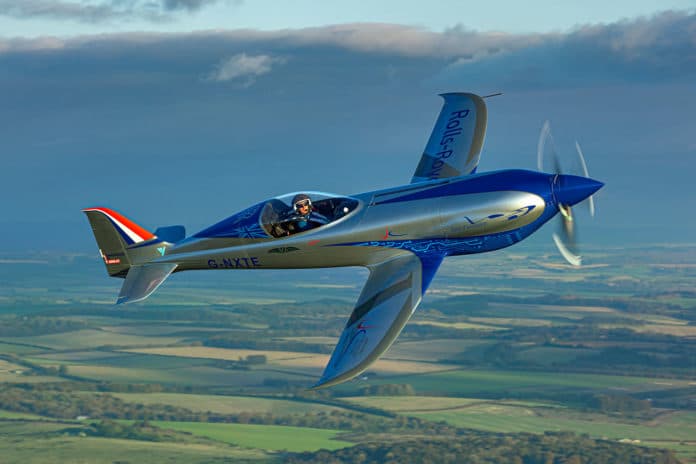Rolls Royce has announced that its all-electric ‘Spirit of Innovation’ aircraft officially became the world’s fastest all-electric aircraft. Two new world records set by the aircraft on 16 November 2021 have been officially verified by the World Air Sports Federation (FAI), which controls and certifies world aeronautical and astronautical records.
Back in November, the aircraft reached a top speed of 555.9 km/h (345.4 mph) over 3 kilometers, smashing the existing record by 213.04 km/h (132 mph). In further runs at the UK Ministry of Defence’s Boscombe Down experimental aircraft testing site, the aircraft achieved 532.1 km/h (330 mph) over 15 kilometers – 292.8 km/h (182 mph) faster than the previous record. During its record-breaking run, the aircraft also clocked up a maximum top speed of 623 km/h (387.4 mph), making it the world’s fastest all-electric vehicle.
But there is one more accomplishment that needs confirmation from FAI. The third record of the company’s all-electric aircraft for the fastest time to climb to 3000 meters in a time of 202 seconds, breaking the current record by 60 seconds, is still going through the verification process.
All three records were achieved in a day. On its record-breaking runs, the aircraft was propelled by a 400 kW (500 hp) electric powertrain and the most power-dense propulsion battery pack ever assembled in aerospace.
During the successful world-record runs, the company gathered important data for its future electric power and propulsion systems for all-electric urban air mobility (UAM) and hybrid-electric commuter aircraft. The company says the characteristics that air taxis require – such as the batteries – are very similar to what was developed for the ‘Spirit of Innovation.’
“Rolls-Royce’s revolutionary Spirit of Innovation aircraft is yet more proof of the UK’s enviable credentials when it comes to innovation,” said Business Secretary Kwasi Kwarteng. “This record will show the potential of electric flight and help to unlock the technologies that could make it part of everyday life. The government is proud to back projects like this to leverage the private investment necessary to unlock cleaner, greener aircraft which will allow people to fly as they do now, but in a way that cuts emissions.”
